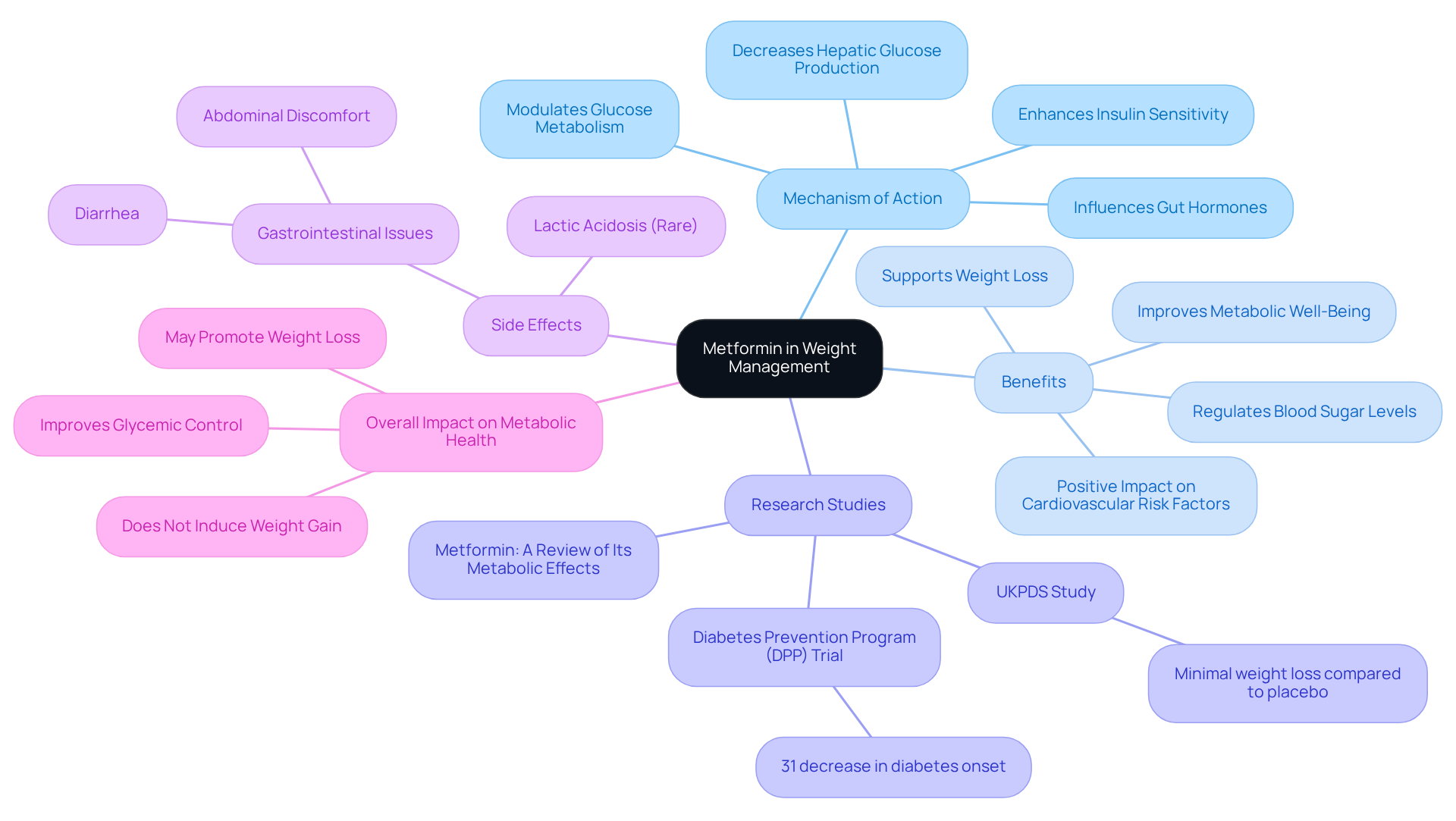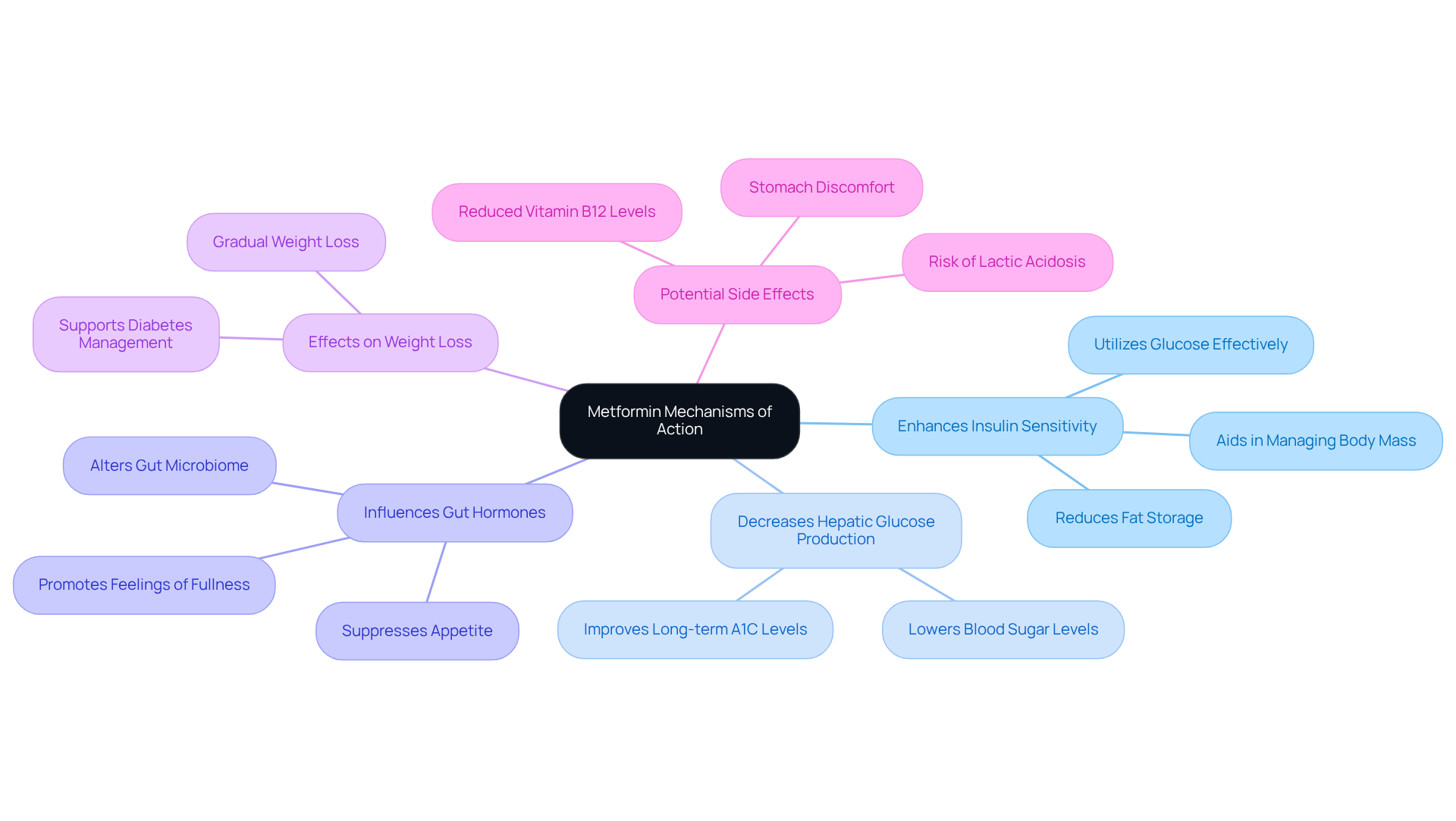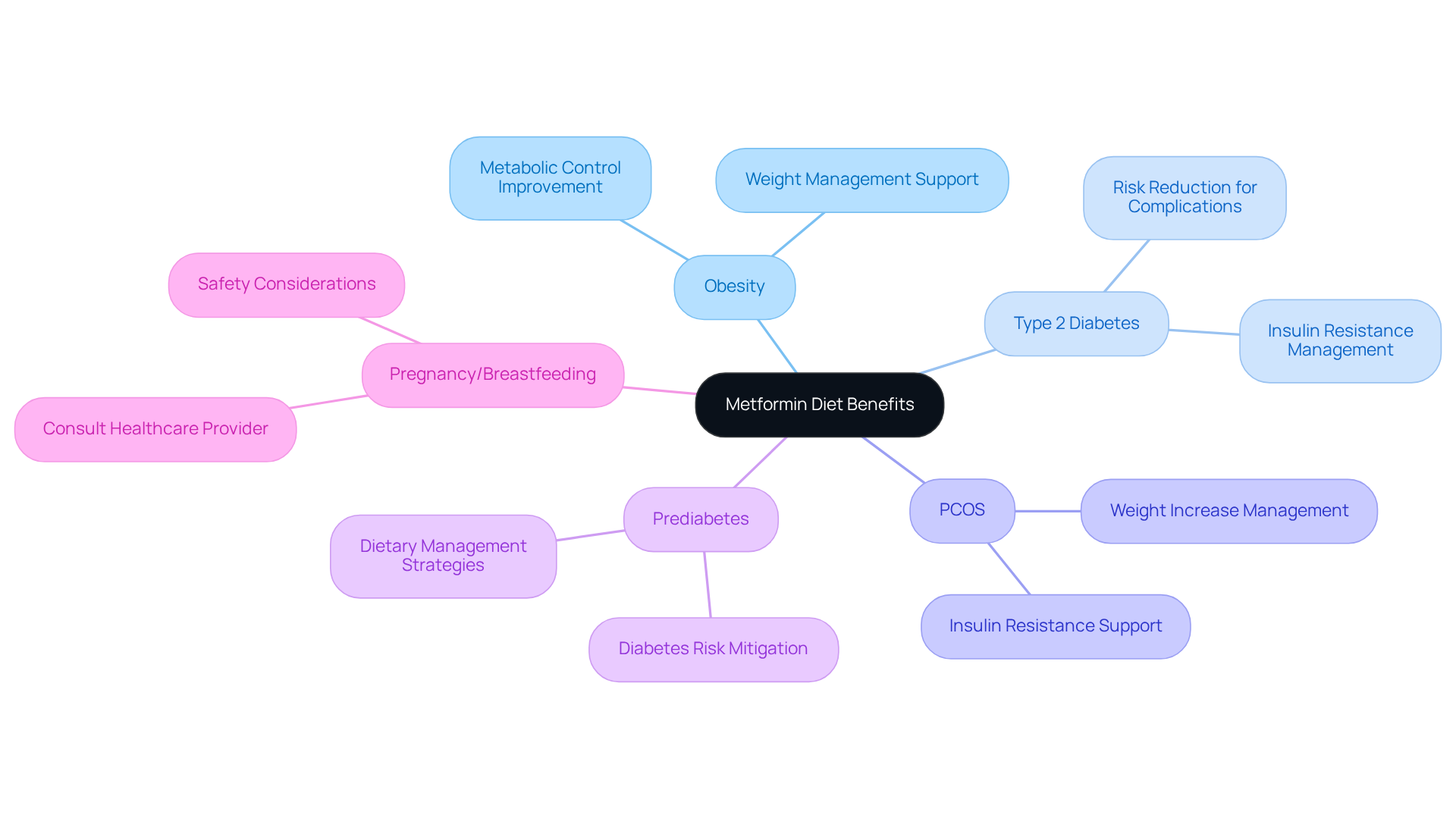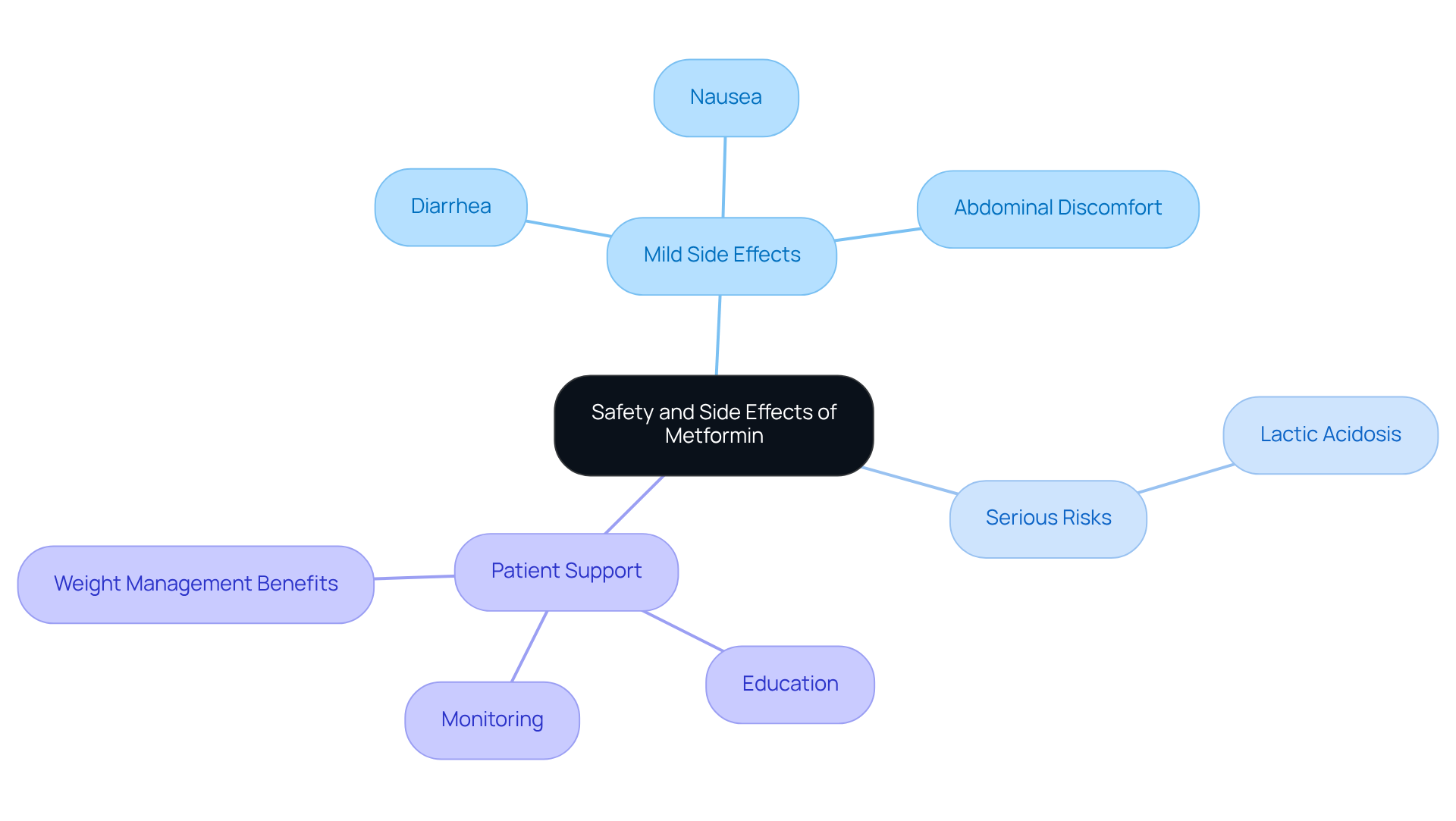Overview
The Metformin diet can be a valuable ally for those navigating the challenges of weight management and metabolic health, especially for individuals facing type 2 diabetes, obesity, or insulin resistance. It’s important to understand how Metformin works—by enhancing insulin sensitivity, reducing hepatic glucose production, and influencing gut hormones, it supports weight loss in a compassionate way. While we explore these benefits, we also address potential side effects and its role in managing various health conditions, ensuring you feel informed and supported on your journey.
Have you ever felt overwhelmed by your weight loss journey? You’re not alone. Many individuals share similar struggles, and that’s where Metformin can make a difference. By fostering a deeper connection with your body’s needs, this approach can help you regain control and find a path that feels right for you. Together, we can explore how these insights can empower you to take actionable steps toward better health.
Remember, you’re not in this alone. With the right support and understanding, achieving your health goals is possible. Let’s embrace this journey together, focusing on the positive changes that Metformin can bring to your life.
Introduction
Metformin, a medication primarily known for its role in managing type 2 diabetes, has emerged as a potential game-changer in the realm of weight management. By enhancing insulin sensitivity and regulating glucose production, it offers a multifaceted approach that not only helps control blood sugar but also supports weight loss efforts.
As individuals seek effective solutions for obesity and metabolic health, it’s natural to wonder: Is the metformin diet truly effective, and who stands to benefit the most? Exploring these questions reveals the intricate balance between its advantages and potential side effects, making it a critical topic for those navigating the complexities of weight management. Together, we can explore how Metformin might fit into your journey toward better health.
Defining Metformin: A Key Medication in Weight Management
This oral medication is primarily utilized for managing type 2 diabetes, recognized for its ability to enhance insulin sensitivity and decrease hepatic glucose production. Since its FDA authorization in 1994, it has effectively regulated blood sugar levels while also emerging as a potential ally in controlling body mass. Have you ever felt overwhelmed by the challenges of weight management? This medication is often recommended for off-label use to support weight loss, especially for those dealing with obesity or insulin resistance. It can assist in achieving modest reductions in body mass and enhancing metabolic well-being. Its multifaceted mechanism of action involves modulating glucose metabolism and influencing gut hormones, contributing to its effectiveness as a management tool for body mass.
At Minimal, we’re here for you. We provide this medication as part of our comprehensive solutions for reducing body mass, starting at just $99.99/month. Our approach is designed to facilitate individualized health paths, combining reduction prescriptions with extensive health care. This metformin diet not only aids in managing body composition but also enhances overall metabolic well-being, making it a valuable addition to any weight reduction program. Together, we can achieve your goals.
Numerous case studies highlight the drug’s impact on obesity treatment. For instance, the UKPDS study demonstrated that it did not cause an increase in mass and showed minimal reduction compared to placebo, indicating its usefulness in mitigating weight gain associated with other diabetes therapies. Furthermore, the Diabetes Prevention Program (DPP) trial revealed that while intensive lifestyle interventions significantly reduced diabetes onset by 58%, the medication alone led to a 31% decrease, underscoring its importance in controlling body mass.
Endocrinologists have observed that enhanced metabolic regulation with this medication does not lead to weight gain and may even promote weight loss, reinforcing its role as a beneficial choice for those seeking effective weight control solutions. However, it’s essential to consider potential side effects, primarily gastrointestinal issues like abdominal discomfort and diarrhea, which can occur in some patients. We believe it’s important to discuss these side effects for a balanced perspective on the medication’s use. Additionally, this medication has been associated with positive impacts on cardiovascular risk factors, making it a versatile tool in managing obesity and overall metabolic health. As research continues to evolve, this medication remains a cornerstone in the conversation about obesity treatment and metabolic health.
Mechanisms of Action: How Metformin Promotes Weight Loss
This medication is designed to support your journey towards fat reduction through several helpful mechanisms. Firstly, it enhances insulin sensitivity, which allows your body to utilize glucose more effectively and reduces fat storage. This improvement in insulin sensitivity is particularly crucial for individuals with type 2 diabetes, as it not only aids in managing body mass but also helps lower blood sugar levels.
Secondly, metformin works to decrease hepatic glucose production, leading to reduced blood sugar levels and improved long-term A1C levels for better glucose control. Additionally, it positively influences gut hormones such as GLP-1 (glucagon-like peptide-1), which can suppress appetite and promote feelings of fullness. Have you ever wondered how your gut health affects your weight loss journey? Studies have shown that metformin can also alter the gut microbiome, potentially leading to improved metabolic outcomes.
However, it’s essential to be aware that metformin may cause side effects, including:
- Stomach discomfort
- Reduced vitamin B12 levels with long-term use
- A rare but serious risk of lactic acidosis if not used properly
It’s important to discuss these aspects with your healthcare provider. This medication is FDA-approved to assist adults with type 2 diabetes in controlling blood sugar levels when combined with a balanced diet, including a metformin diet, and regular exercise. Together, these effects can lead to gradual weight loss, making metformin a valuable option for individuals looking to manage their size while also addressing their diabetes. Remember, you’re not alone in this journey; we’re here for you every step of the way.
Target Populations: Who Can Benefit from the Metformin Diet?
If you’re navigating the challenges of obesity, especially with insulin resistance or type 2 diabetes, know that there are supportive options available, such as following a metformin diet. This medication can be especially beneficial for you. It’s often recommended for individuals with polycystic ovary syndrome (PCOS), as they may experience an increase in weight and insulin resistance. Moreover, if you’re prediabetic or at risk of developing diabetes, following a metformin diet alongside this medication’s management features can be a valuable ally in your journey toward better health.
Research suggests that following a metformin diet can help improve metabolic control and reduce the risk of diabetes-related complications for these populations. However, it’s important to understand that this medication is not FDA-approved specifically for weight loss. You might experience common side effects, like gastrointestinal discomfort, including nausea, diarrhea, or stomach upset, especially during the first few weeks of treatment. If you’re pregnant, it’s crucial to consult your healthcare professional before considering this medication for weight loss.
While it’s generally safe to use while breastfeeding, we encourage you to speak with your healthcare provider to ensure it’s the right choice for you. Remember, your health journey is unique, and healthcare professionals are there to evaluate your individual needs and customize your treatment plan. Together, we can achieve your goals, ensuring a comprehensive approach to your management and overall health.
Safety and Side Effects: Understanding the Risks of Metformin
This medication is generally well-tolerated, but we understand it can cause side effects, particularly gastrointestinal issues such as:
- Nausea
- Diarrhea
- Abdominal discomfort
Thankfully, these side effects are often mild and can diminish over time. However, we want to be transparent about more serious risks, such as lactic acidosis, which, although rare, can occur, especially in individuals with kidney impairment or other contraindications.
At Minimal, we’re here for you. We prioritize patient education and regular monitoring to mitigate these risks, ensuring that our clients are well-informed and supported throughout their journey to reduce excess pounds. Our comprehensive method combines loss prescriptions, including a specific medication, with individualized fitness and nutrition strategies. Together, we can achieve lasting health enhancements.
Overall, the benefits of a metformin diet in managing weight and improving metabolic health often outweigh the potential side effects. This makes it a valuable option for many patients seeking a comprehensive wellness solution. Remember, we’re in this together, and your health journey is important to us.
Conclusion
The metformin diet stands out as a compassionate strategy for managing weight and enhancing metabolic health, especially for those facing the dual challenges of type 2 diabetes and obesity. While metformin is primarily recognized for its ability to regulate blood sugar, it also brings meaningful benefits for weight management through its multifaceted mechanisms. These include:
- Improved insulin sensitivity
- Altered gut hormone activity
By understanding and embracing the metformin diet, individuals can take proactive steps toward achieving their health goals.
Throughout this article, we’ve explored how metformin functions, revealing its role in promoting weight loss while addressing underlying metabolic issues. Evidence from various studies highlights its effectiveness in preventing weight gain often associated with other diabetes treatments, showcasing its potential to enhance metabolic regulation without significant side effects. It’s vital to recognize the importance of individualized healthcare approaches, particularly for those with:
- Insulin resistance
- Polycystic ovary syndrome
- Prediabetes
Ultimately, embracing the metformin diet can be a transformative choice for anyone seeking to improve their health and manage their weight effectively. As research continues to unveil the broader implications of this medication, we encourage you to consult healthcare professionals to tailor treatment plans that resonate with your personal health needs. By taking informed actions and remaining engaged in your health journey, you can harness the benefits of metformin, paving the way for a healthier future together.
Frequently Asked Questions
What is Metformin primarily used for?
Metformin is primarily used for managing type 2 diabetes. It enhances insulin sensitivity and decreases hepatic glucose production.
How long has Metformin been approved for use?
Metformin has been FDA-approved since 1994.
Can Metformin assist in weight management?
Yes, Metformin is often recommended for off-label use to support weight loss, particularly for individuals dealing with obesity or insulin resistance.
What are the effects of Metformin on body mass?
Metformin can assist in achieving modest reductions in body mass and enhancing metabolic well-being.
How does Metformin work in the body?
Metformin modulates glucose metabolism and influences gut hormones, contributing to its effectiveness in weight management.
What are the costs associated with obtaining Metformin through Minimal?
Minimal provides Metformin as part of their solutions for reducing body mass, starting at $99.99 per month.
What do case studies say about Metformin’s impact on obesity treatment?
Case studies, including the UKPDS study, show that Metformin does not cause weight gain and has minimal reduction compared to placebo, indicating its usefulness in preventing weight gain associated with other diabetes therapies.
What did the Diabetes Prevention Program (DPP) trial reveal about Metformin?
The DPP trial revealed that Metformin alone led to a 31% decrease in diabetes onset, highlighting its role in controlling body mass.
Are there any side effects associated with Metformin?
Yes, potential side effects primarily include gastrointestinal issues such as abdominal discomfort and diarrhea.
Does Metformin have any positive impacts beyond weight management?
Yes, Metformin has been associated with positive impacts on cardiovascular risk factors, making it a versatile tool in managing obesity and overall metabolic health.





















